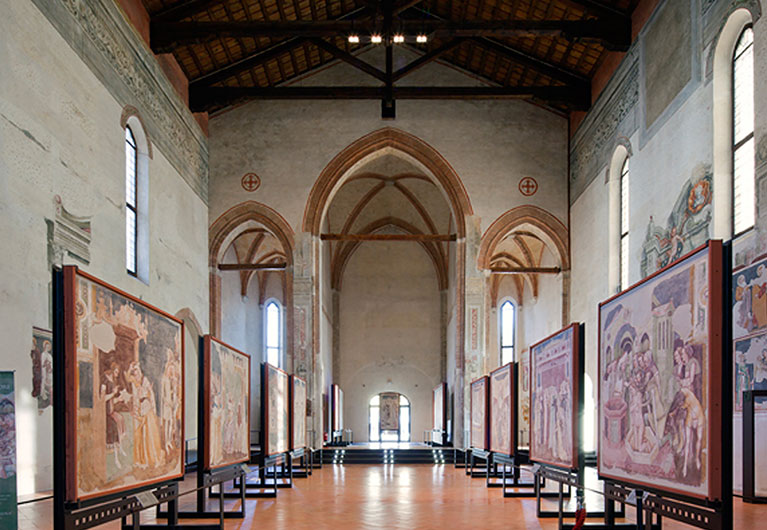SACHE
Museo Santa Caterina Treviso
Descrizione
Gamification – Civic Museums of Treviso, Pleiadi Group & Venetian Cluster
The project aims to use processes of gamification, tailor-made for the museum spaces with the objective of attracting a new public, promoting cultural content and the transfer of knowledge. Actors involved have been the administrative manager of the Civic Museums of Treviso, the head of the activities, exhibition activities, and special projects, of the museum Luigi Bailo, the cluster director of Venetian Cluster, the junior project manager of Venetian Cluster, the junior communication and marketing of Venetian Cluster and the scientific director and head of teaching of Pleiadi Group (Vicino, 2021).
The Civic Museums of Treviso is an institution that counts three locations within the city walls: the Museum of Santa Caterina, the Museum Luigi Bailo, and Casa Robegan. The primary objective of the institution is the safeguard and diffusion of the artistic and cultural heritage it holds, which pursues the willingness for preservation initiated by Luigi Bailo. The different museums of the institution permit to have a rich cultural offer, but at the same time determine some difficulties in managing internal and external communication. The primary need they have identified was to involve the age group between 14 and 25 years, for which the theme of the game is considered a key aspect in engaging the new public of young people and generating in them a sense of belonging to a place thanks to serialized activities to be carried out inside the museums. This is intertwined with the necessity to employ different communication strategies.
The Pleiadi Group is a social cooperative society that operates in the educational field to bring younger people to the STEAM disciplines (Science, Technology, Engineering, Art, Mathematics) through interactive workshops within schools, events to involve young people and adults, and the creation of content to train and inform target audiences: they define themselves as scientists who provide tailored made interactive practical experiences to children, adults, schools, universities, collaborators, companies, families, institutions and multinational enterprises (https://www.pleiadi.net/).
Venetian Cluster is a productive cluster dedicated to cultural and environmental heritage in Italy (www.venetiancluster.eu). Its primary objective consists in realizing innovative national and international projects, aimed at technological transfer, internalization of services, and training for the public-private supply chain of the cultural and environmental sectors. It coordinates public and private partners, offering services of regional, national, and international funds’ research to develop projects, technical and scientific advice, innovative computer marketing, assistance with services and technologies of innovation, training, and coaching, and development of innovative activities for thematic tourism (ibid.).
From the different meetings, from the first willingness exhibited by the Civic Museums of Treviso to attract the younger generations through the theme of the game, the project developed into a solution involving people physically present at the museum, following paths of gamification and riddles through artistic works and findings in analogical format, leaving aside the idea of using AR or VR technology. It is a more economically sustainable solution that welcomes the possibility to leave something concrete to the visitor, such as a gadget. The concept of the escape room is not new or perceived by the public as a novelty, but it is not common to find this solution inside a museum. (Vicino, 2021)
This is an interesting example of project design that puts the attention on the communication between the actors involved and underlines how different organizations can be compatible in satisfying reciprocal needs. They do not identify a time frame and there are currently no internal financial resources available for the project, highlighting again a difficulty in finding and managing resources of a public institution.
TITOLO:
SACHE - Museo Santa Caterina Treviso
ANNO:
2021
AREA:




